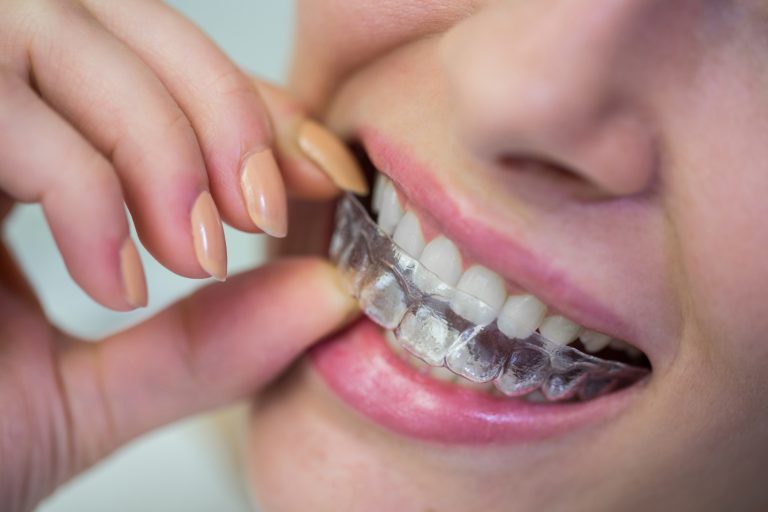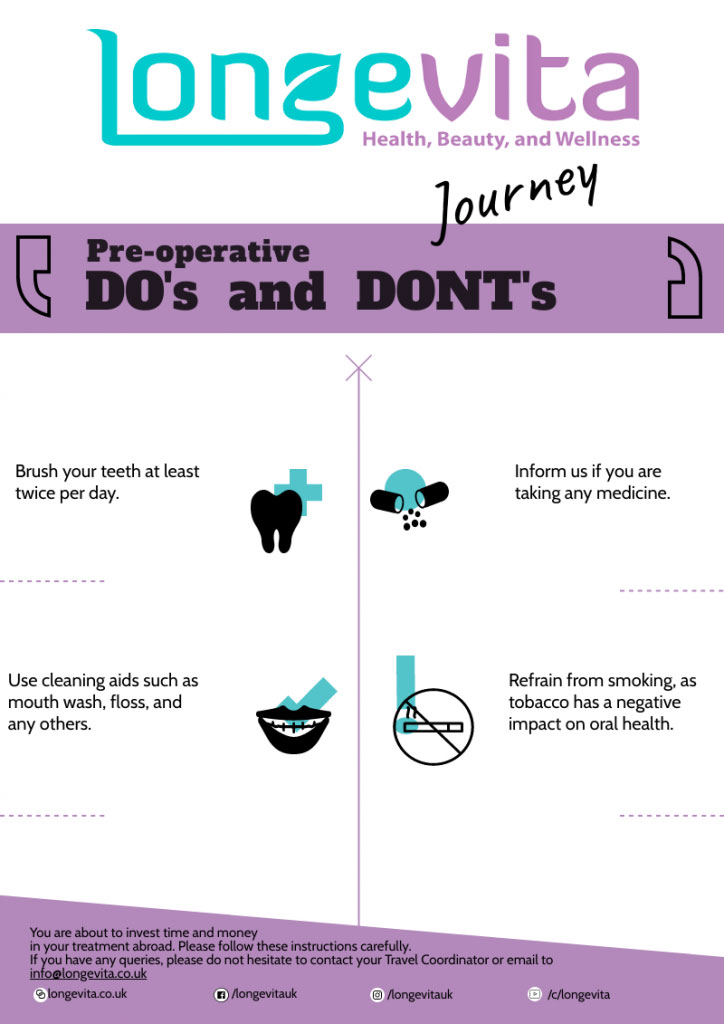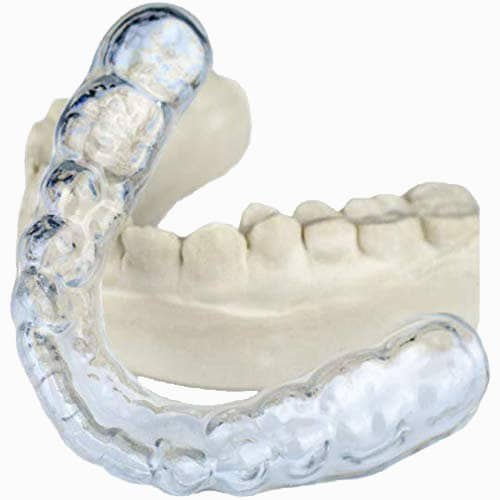A night guard protects the teeth of people who grind them against each other unconsciously. It can also help eliminate the teeth-grinding habit altogether.
What Is A Night Guard?
A night guard is an oral appliance that protects the teeth from frictional wear resulting from grinding. These are also called mouth guards and dental guards.
Patients suffering from bruxism who grind or clench their teeth while they’re awake, in deep thought, or asleep can benefit from this device.
Most of the damage to the teeth can occur during sleep because the person has little control over the situation.
Similar in appearance to retainers, night guards cover the upper jaw. However, those custom-made in a lab can also cover the lower jaw.
Their purpose is to create a soft or hard cushion between the teeth so that they’re not rubbing against each other. This, in turn, protects the enamel of the teeth so that they don’t undergo decay.
In addition, it can relieve different kinds of aches and pains arising from grinding.

Keep in mind that although night guards are used for the treatment of symptoms of teeth grinding, and sometimes, teeth grinding even, you should consult your dentist.
That’s because teeth grinding may be resulting from stress, malocclusion, sleep apnea, and intake of SSRIs.
One study published in the Journal of the American Dental Association also found that those who smoke and drink alcohol are twice as likely to be teeth grinders.
Therefore, you may need different treatments for a solution to teeth grinding.
Types of Night Guards
There are three different types:
Soft Night Guard
Made of soft plastic, they are moulded to the shape of the person’s teeth.
These are more commonly used by individuals who do not grind their teeth as often or as severely. They are the least durable of all.
Hard Night Guard
These are the ones that are commonly used by people who have severe bruxism (extremely hard teeth clenching/grinding). Made from acrylic, these are the most durable of all.
Dual Laminated Night Guard
These are a combination of soft and hard plastic. A dual laminate night guard is soft on the inside and hard on the outside. They’re used by people who have moderate bruxism.
What Is The Cost Of A Night Guard In Turkey?
People want to get a custom-fit dental night guard since it’s better than the one available at pharmacies.
However, that option is more expensive, and it is going to cost you 3-5 times more if you get it at a clinic in the UK.
The type of medical facility, the qualifications of the dentist, and the area where you live are all going to play a role in determining the total cost of a night guard in the UK.
Due to the popularity of medical tourism in Turkey, clinics offer this dental appliance, checkups, hotels, and transfers in one.
Night guards are also quite affordable in Turkey because of the country’s economy.
Who Can Have Night Guard & Why?
They are most suitable in the following cases:
Bruxism
Many people grind their teeth without even realising, and they do it uncontrollably. Therefore, it can cause severe damage to the teeth in the long run.
It’s worth considering getting a mouth guard if you have the following signs of teeth grinding:
- Headaches
- Pain in the face and teeth
- Jaw pain (temporomandibular disorder)
- Sore ears, jaw, neck and face
- Sleep disruption and resultant fatigue
- Broken, chipped, worn teeth
- Accidental biting of the inside of the cheeks
Temporomandibular Joints (TMJ)
If you have a TMJ disorder, you can benefit from wearing mouthguards. People with this condition often experience:
- Jaw pain
- Facial pain
- Earache
- Difficulty chewing
- Difficulty opening mouth
Usually, people with this disorder have to wear it the whole day, so they’re not exactly like bruxism night guards.
Sleep Apnea
It’s a condition in which the person has abnormal breathing while they’re sleeping.
Although people with this condition use a CPAP machine, if the case is mild, a mouth guard can help (it will be different from the one for teeth grinding).
Essentially, it pushes forward the lower jaw along with the tongue so that you can breathe normally.
Am I Suitable For Night Guard?
What To Think About Before You Have Night Guard?
Before getting a night guard for teeth grinding, it’s important that you discuss the details of your problem with a dentist.
As mentioned before, these can help with the symptoms, but they can’t always cure the problem.
Therefore, in addition to getting the bruxism night guard, inquire about additional treatments that you may need.
Other than that, you should discuss how to maintain the night guard with your dentist and its usage if you’re currently undergoing any other orthodontic treatment.
Additionally, you should learn more about the skills, experience and licensing of the dentist and make sure that their clinic is registered with the Turkish Ministry of Health.
How Best To Prepare For A Night Guard Appointment?
Before coming in, you need to make sure that you have a healthy mouth. If this isn’t the case, you might need to get treatment for it first.
That’s because wearing a night guard on top of unhealthy teeth or gums can worsen the problem.
Other than that, make sure to brush your teeth and remove any accessories that you’re wearing around or in your mouth.
It’s also best to skip wearing lipstick or gloss, as the dental tools will smudge them.

What Is The Procedure For Preparing A Night Guard?

To prepare a custom-fit dental night guard, the dentist will first check the condition of your teeth and perform a physical exam.
After that, using dental putty, they’ll take the impression of your teeth. This is sent to the lab.
In the second appointment, the dentist will ask you to put it in your mouth and check if it fits well. If there are any problems, they’ll note them and make adjustments.
Usually, the night guard is made for the upper jaw, but if your dentist finds it necessary, it will also be prepared for your lower teeth. The whole procedure takes 10-15 minutes.
The reason why a custom-fit dental night guard is preferred is that it offers the most comfort because of its accurate shape.
It does not put undue stress on the jaw that a pre-made one can.
Book A Free Consultation With Our Patient Consultants
We offer free consultations for patients across the UK & Ireland, so you can discuss your individual requirements with our specialists. Book A Free Consultation With Our Patient Consultants Today.
Results Of Night Guard
Because of the non-invasive nature of the procedure, there’s no downtime.
You can resume your normal routine after the first and second appointments.
Wearing a night guard, however, is subject to a few restrictions for the duration of time you wear it.
Initially, it may feel uncomfortable to wear.
However, to get used to it, you can make sure to wear it every night for 1 month.
How to Clean The Night Guard?
Just as you take care of your teeth, you need to keep your dental night guard clean.
If you don’t clean it, the bacteria from your mouth will continue to build up in it, and it can cause infections.
Make sure that you clean the night after you’ve used it and before you’re going to use it.
You can use your toothbrush and toothpaste to get into the crevices of the night guard or use plain soapy water.
Don’t run it under too hot water because it can warp the plastic. It can also crack if the water’s too cold. You should also avoid placing it in direct sunlight.
After washing, you can let it air dry or store it in a container that has vents in it. This will not let the air get damp, allowing bacteria to grow.
Keep an eye on your dental night guard to see if it has any wear and tear or holes. During your regular dental checkups, have your dentist check it out as well.
Ensure your mouth guard is placed out of reach of pets, as they can use it as a chew toy.
Side Effects Of Wearing A Dental Night Guard
Most people feel discomfort from wearing this oral appliance for teeth clenching.
It can even slightly irritate the gums, but your mouth should adjust to it after some time.
What Could Go Wrong After Wearing A Night Guard?
If the night guard is not properly taken care of, you can end up with pain and soreness because of the strain on the jaw and the teeth.
Some kinds can also end up changing the bite. If kept unclean, your bruxism night guard can cause infections that not only affect the mouth but also other areas of the body.
What To Do If You Have Problems With Your Night Guard?
If you’re experiencing problems with your night guard, you should get in touch with the Aftercare team. You can email them or book a phone consultation.
They’ll get in touch with your dentist for an assessment. Other than that, you can always open a ticket in the Support Portal for help.
Alternatives To A Night Guard
If you’re using a night guard for teeth grinding, you can consider getting Botox as an alternative to it. Paralysing the muscles involved in chewing can help with the condition.
Its effects last for 3-4 months. Those who wear mouth guards for TMJ pain can also consider Botox, which targets the masseter muscle.
FAQ
Do I need to wear the night guard every night?
It’s better if you do, especially if you grind your teeth a lot. Unconscious teeth clenching and grinding when you’re sleeping can cause a lot of damage in the long run. So, it’s better to wear it daily.
Why is my night guard turning yellow?
Improper cleaning can be one reason why the night guard is turning yellow. However, as it ages, the plastic itself can turn yellow due to different reasons.
You should replace your night guard if it gives off an unpleasant smell, has mould spots, and is yellow.
Can a dental night guard act as a retainer?
It depends on the type of night guard you’re using. If it’s a hard one that’s custom-fitted to your teeth, you may be able to use it as an alternative to a retainer. However, it’s best if you consult your dentist before using it.
Does a night guard help straighten teeth?
A clear aligner is not the same as a night guard for teeth clenching, even though they’re both removable. You cannot expect a night guard to align your teeth straight. You need to get braces for that. Alternatively, you can get dental crowns.
Are night guards safe?
Night guards are safe for use when you’re sleeping. They create a safer environment for your teeth where they’re protected from the erosion of the enamel and decay. However, you should make sure to keep it clean so that you’re using it safely.
Can a night guard cause jaw pain?
A night guard can cause jaw pain when it’s not the right fit or poorly made. It can cause pain in two ways:
- Putting pressure on the jaw,
- Worsening grinding, which, in turn, causes jaw pain.
Can you wear a night guard with braces?
Wearing a night guard for teeth grinding with braces should not be a problem. Wearing a mouth guard is recommended if you play contact sports with braces on.
It can protect it against blunt force. However, again, it’s better to have them custom-made because they have a better shape.
How long does a night guard last?
Your night guard should be able to last for a few years. However, there can be variations depending on how severe your problem is and how frequently you use the appliance.
In case it has experienced too much wear and tear, you must replace it, regardless of when it was purchased.
Can wearing a night guard worsen my cavities?
That can happen if you don’t properly clean it. The accumulation of bacteria can cause infections and result in tooth decay (or worse existing ones).
Can night guard cause canker sores?
If the night guard doesn’t fit properly, the constant rubbing can cause canker sores. If you’re experiencing this problem, you should get in touch with your dentist.
Reviewed and approved by Dr. Izbel Aksit.